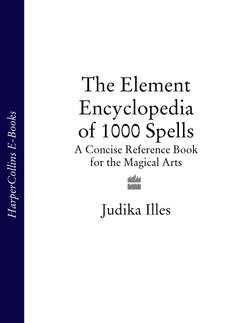Читать книгу The Element Encyclopedia of 1000 Spells: A Concise Reference Book for the Magical Arts - Judika Illes - Страница 78
Spirit Categories Angels
ОглавлениеAngel literally translates as “messenger” in Greek, a direct translation from the Hebrew. Unlike other categories of spirits, angels do not accept “offerings,” or at least not officially. They are customarily called through prayer, petition, and fragrance, although High Ritual Magic, based largely on information attributed to King Solomon, compels the presence of angels through sigils and talismans.
Specific angels maintain charge of all matters of life. There is an Angel of Conception, the Angel of Thieves, angels of various specific countries, and individual guardian angels. According to the Talmud, there are eleven thousand guardian angels per person. If you can think of it, it has a custodial agent.
In general, they are dynamic and fierce; creatures of light so blinding you can’t help but see them even with your eyes closed. According to Jewish mysticism, angels are beings of light, but when an angel wishes to manifest in physical form, it takes earth, fashions clothing from it, and transforms itself.
Angels are discussed before other spiritual entities because they are somewhat different from others, and because (according to Islamic and Jewish traditions), angels are personally responsible for humanity’s ability to cast spells. The Creator may have created magic power but angels taught people how to recognize it and what to do with it. They are our magical teachers.
Christian magic, reflecting theology, demands the existence of angels as creatures of pure goodness (with the exception of the fallen angels, who essentially lost their status as angels during the Fall), in clear opposition to demons, who are plainly “bad.” This is not the case in Islamic, Jewish, and Pagan perceptions, where angels are just beings of power. There are good angels, “evil angels,” and angels who may be persuaded to behave in either direction. Pious descriptions of “good” angels insist that they are asexual and gender-less, although ironically this is in opposition to the Bible, which describes the lust angels feel for human women (Genesis 6:1–4). Because these women conceive children, we can assume these particular angels to have been male with all working parts intact.
Instead of courting these human women with chocolates and roses, the angels bestowed the gift of knowledge—teaching the arts of astrology, magic, witchcraft, and cosmetics (not the triviality it may appear today but an ancient magical art). According to the Book of Enoch these teaching angels and their subjects included:
Semjaza: enchantments and root cutting
Armaros: the resolving of enchantment
Baraquiel: astrology
Kokabel: constellations
Ezequeel: knowledge of the clouds
Araquiel: earth signs
Shamsiel: sun signs
Sariel: the phases of the moon
Angels are ranked in various manners: Archangels, Throne Angels, Watchers, Seraphim, and Cherubim among others. The archangels command spirit hosts. Various spells request assistance from the archangels, however whether they are personally expected to appear or to delegate another from their host may be subject to interpretation.
There’s little agreement among experts or traditions, particularly as regards to the archangels. Are there seven or are there four? And which ones are they?
The standard four archangels are Rafael, Gabriel, Michael, and Auriel, also spelled Uriel or Ariel. That much, at least, is agreed upon in Christian, Islamic, and Jewish traditions, and probably pre-dates all three. But do they serve alone or are there really seven archangels, corresponding to the seven planets visible with the naked eye and to that magic number, seven? If that’s the case, who are the other three? Some possibilities include Cassiel/ Kafziel, Zadkiel, Samael, Chamuel, Jophiel, Raziel, Metatron, and Iblis. Even Lucifer makes it onto some lists, although obviously he loses his status after his Fall. (Most angels, but not all, have names ending with “-el,” El being the ancient pan-Semitic name for the Creator, literally “the Lord.”)
